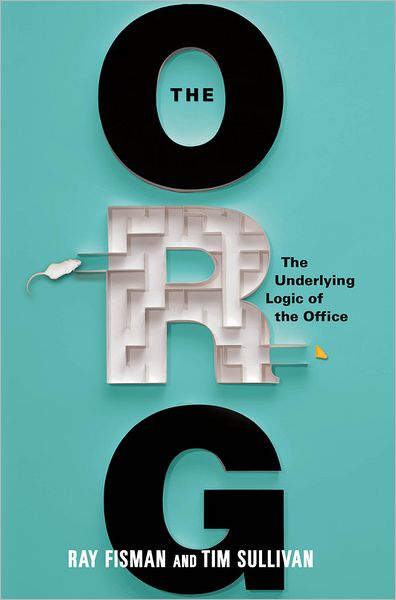book spotlight: the org by ray fisman and tim sullivan
Last week, Teppo commented “The Org: The Underlying Logic of the Office,” a book by CBS prof Ray Fisman and editor/writer Tim Sullivan that brings organization theory to a popular audience. This week, I’ll add a few of my own comments to the discussion. Later, Ray and Tim will be contributing to the blog.
In summary, The Org brings to the educated reader an argument about why organizations are important and how they work. It’s about coordination and routinization. Modern life simply requires big tasks that can’t efficiently be done with managers, bosses, and CEOs. It’s the sort of book that you might give someone who is just starting to think about why the social world is the way it is.
The book covers a lot of basic territory in a crisp and easy to grasp way. The book gives great examples of principal agent problems, superstar markets, and the problems of vertical integration. The examples range from the for-profit world, to the military, to churches.
In particular, I enjoyed the chapter on innovation. The issue is that innovation and organization are at odds with each other. Organizations thrive because they can exploit scale and produce the same product over and over. That requires people to obey. In contrast, innovation requires that people diverge from established routine. Rather than give in to a feel good approach to innovation, Fisman and Sullivan sensible point out that the tension between organization and innovation is natural and that it will be solved in different ways. They give good examples that show the range of solutions. McDonald’s demands conformity from franchisees and innovates in a lab, while Lockheed Martin famously created a separate entity that encourage wildly creative innovation Yes, that is old school contingency theory, but it remains a good insight.
A few nit picks. Rhetorically, I wish the book had been a little more cognizant of the interdisciplinary nature of organization studies. The book begins with the typical “an economist looks at …” discussion that is in vogue in the post-Levitt era of popular economics writing. But the book itself covers a lot of great material from managerial economics, business school scholarship, sociology, history, and even concludes with a quote with the old man himself, Max Weber. Also, I wish the book had said a little more in the conclusion about the social consequences of management. The world we have today is shaped by management philosophy and management itself has given rise to a new class of people. That deserves some discussion. But overall, these are quibbles, though. The book’s a winner and I’m sure it’ll start appearing in organization studies syllabi.
Adverts: From Black Power/Grad Skool Rulz

Hi Fabio,
Thanks so much for the review. I really appreciate it.
On the acknowledgment of other sources, we struggled with that a bit. We tried hard to stick to the org econ lit, which of course has lots of crossover with other disciplines, but also sneaked some other material in there as well (the Weber, for instance: couldn’t resist the iron cage).
Maybe the social consequences of management are something that Ray and I can take up here when we guest blog.
Thanks again,
Tim
LikeLike
Tim Sullivan
February 27, 2013 at 3:54 pm
Dear Fabio,
What would be the best textbooks of org theory? Like, advanced undergrad or possibly grad-level, something that would cover the main areas of knowledge in organization sciences?
LikeLike
Luis
February 27, 2013 at 4:56 pm
[…] about their recently published book The Org: The Underlying Logic of the Office. [Here's Fabio's post about their book, and […]
LikeLike
Ray Fisman and Tim Sullivan guest blogging | orgtheory.net
April 1, 2013 at 12:25 am
[…] deficiency Fabio called out in his Org Theory review of The Org is the paucity of discussion on the social consequences of management. With our […]
LikeLike
social consequences of management | orgtheory.net
April 1, 2013 at 4:56 am
I used to be suggested this website via my cousin. I am now not sure whether or not this submit is written by means of
him as no one else realize such specific about
my trouble. You’re amazing! Thanks!
LikeLike
Immigration Lawyers in kingston upon thames
April 2, 2013 at 11:36 pm
Howdy, i read your blog from time to time and i own a similar one and i was just wondering if you get
a lot of spam feedback? If so how do you stop it, any plugin or anything you can recommend?
I get so much lately it’s driving me insane so any support is very much appreciated.
LikeLike
Immigration Solicitors in Honslow
April 5, 2013 at 11:29 am
This is my first time pay a visit at here and i am genuinely happy to read all at single place.
LikeLike
Immigration Adviser Essex
April 10, 2013 at 10:20 pm